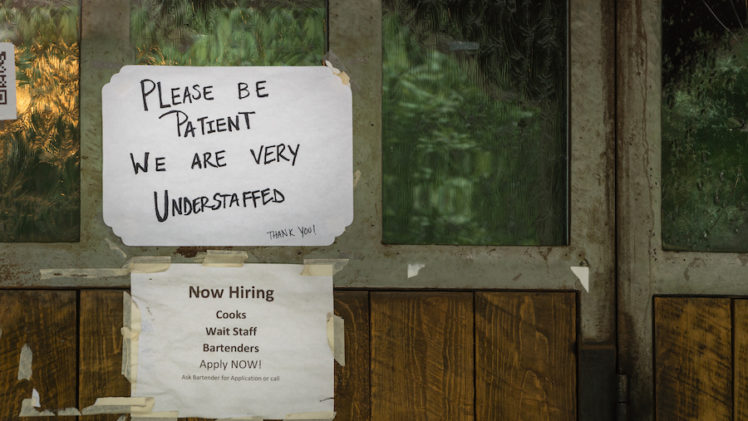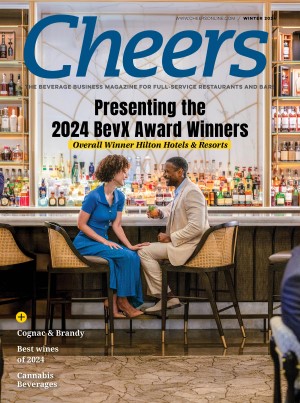While the overall economy has made steps toward recovery, the hospitality sector still suffers from a marked labor shortage. The situation has restaurateurs and hoteliers unable to achieve their pre-pandemic staffing levels. Meanwhile, wages have increased across the sector while hiring has been more competitive than ever with the hospitality sector making up a plurality of new jobs, according to recent reports.
Special unemployment payments alone cannot explain the sustained staffing challenges and increasing wage pressure. We have now seen states experiment with discontinuing supplemental payments as a variable in solving labor shortages, without measurable effect. And the wage increases for hospitality workers are not being seen in other traditionally low-wage sectors.
The shortages instead stem from features unique to hospitality work. Beverage industry professionals—particularly those working in the front of house—face problems from this pandemic that other workers have not.
First, many hospitality businesses rely on recreational activity. Because the public stopped traveling and dining out, businesses laid workers off and outsourced the face-to-face aspects of hospitality to app-based companies and their independent contractors.
The instability of being laid off during a pandemic caused many hospitality workers to consider changing their field of work. According to a Pew study, 66% of unemployed people (of any field) “seriously considered” changing their fields of work, a far greater percentage than considered doing so during the great recession.
That instability did not simply disappear with optimism about possible economic recovery. Similarly, with layoffs and the need to keep socially distant, many hospitality workers faced childcare problems that did not simply go away when businesses began to reopen.
Other sectors could institute serious exposure-risk mitigation strategies, such as permitting employees to work from home, ensuring social distancing at work, adding ventilation systems and even providing full PPE and procedures for handling the known or likely infected. But beverage professionals must come face-to-face with unmasked guests with unknown vaccination statuses and varying beliefs on the seriousness of Covid-19.
Issues such as the confining layouts of existing bars or the need to directly interact with guests prevent even modest risk-reduction methods. This wavering but consistently unquantifiable degree of risk further disincentivizes guest-facing workers from returning to normal.
The altered staff-guest dynamic resulting from politicization of various aspects of the pandemic—and inconsistent private, local, state and federal guidance or mandates on prevention—further complicate hospitality workers’ comfort with returning to face-to-face work during a pandemic. The new dynamic prevents staff from prioritizing hosting and hospitality at all times. Instead, staff must now risk entering conflict with guests when asking them to comply with masking or other preventive rules when entering the establishment or moving about the restaurant.
Each of these factors, the perceived economic instability associated with pandemic decreases in recreational spending (or transferring service-related spending from direct interactions to app-mediated experiences), significant Covid-19 exposure risk, and the material limitations on the ability to provide great hospitality, all contribute to labor shortages.
Recruiting and Retaining Talent
Strategies for recruiting talent under these conditions require a solid marketing and public relations campaign while tactics for retaining talent will require both the campaigning efforts and the actions to back up the campaign promises made. Items that make for promising recruitment materials include:
- Basic employment statistics like wages (both base pay and signing or retention bonuses) and benefits programs if these offerings meet or exceed the prevailing wages or benefits offered in the market. Does the employer provide for flexible scheduling or other special pandemic adaptations? Does the employer offer health insurance? Can employees participate in a 401k? Does the employer match some retirement contributions?
- Demonstrated consideration about the plan for continued and further resurgences of the pandemic. Were staff retained during lockdown? What should the employee expect or prepare for with upcoming lockdowns?
- Information about Covid-19 policies. Does the establishment require mandatory masking of guests regardless of status of local, state or federal indoor mandates? How are policies enforced—by a manager, bouncer, or other authority figure? Do employees need to show proof of vaccination or establish an eligible exemption?
Retaining talent will then require employers to follow through on these promises. Note that certain promises might be seen as contractually binding while a failure to live up to others would merely be likely to damage morale.
Efforts to recognize talent, for instance by putting promising staff on a management track or paying a retention bonus, should be applied fairly. Even well-meaning efforts to retain talent can lead to lower morale for all if everyone does not feel adequately valued.
Reducing Legal Risks in Recruiting and Retaining Talent
Besides requiring planning efforts and the necessary cash flow to sustain increased benefits and pay, efforts to recruit or retain talent can bring legal risks. Federal, state, and local antidiscrimination laws govern these decisions and to comply with these laws, employers must make employment decisions without reference to disability, sex, race, color, creed, or national original at minimum.
Discrimination can be shown by both disparate treatment, that is, treating an individual differently because of their protected characteristic, and disparate impact, that is, when a policy decision has an improper and disparate effect on a group with a shared protected characteristic. Thus, employers must advertise and decide who to recruit or rehire and who to retain in a nondiscriminatory way.
Disability and religious discrimination operate slightly different, with an obligation to engage in interactive dialog between employee and employer and to reasonably accommodate disabilities and religious beliefs. Diligent employers requiring employees (new or current) receive the Covid-19 vaccine may face discrimination claims.
For example, a claim could allege that the request constituted an unnecessary medical inquiry (this seems unlikely for congregate work settings but could be plausible for remote workers), or a failure to reasonably accommodate a medical disability preventing vaccination or a sincerely held religious belief.
What’s more, decisions to hire certain employees and not others or to hire new employees rather than laid-off employees may look like discrimination in some cases. While no law requires rehiring employees in a certain order, an employer must make decisions to rehire or not rehire a former employee on a legitimate, nondiscriminatory basis.
For instance, only hiring new employees under 40 instead of rehiring prior employees over 40 could serve as evidence of age discrimination. But a practical, cost-benefit analysis motivating a decision to hire less-experienced and therefore potentially younger workers (such as that the workers hired were willing to accept a rate below what more experienced and therefore potentially older applicants sought) could discourage claims of age discrimination, especially where the complainant could not show that the given reason was pretextual.
Similarly, employees may point to retention bonuses paid to certain employees over others, or efforts to promote certain classes of employees over others, as evidence of discriminatory intent. Instead, employers need to apply neutral (nondiscriminatory) criteria for providing bonuses and keep opportunities for advancement open to all employees.
Colin Barnacle is a partner at law firm Nelson Mullins based in Denver and was formerly division general counsel for WhiteWave Food Co., and Nick Ladin-Sienne is an associate at Nelson Mullins in Boston and a former professional chef.









